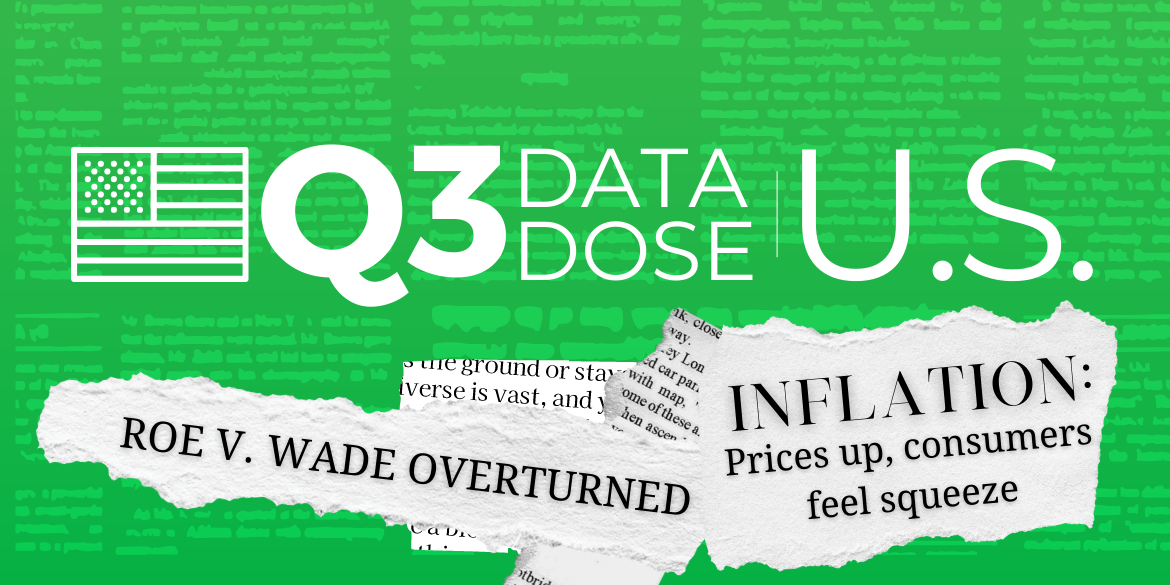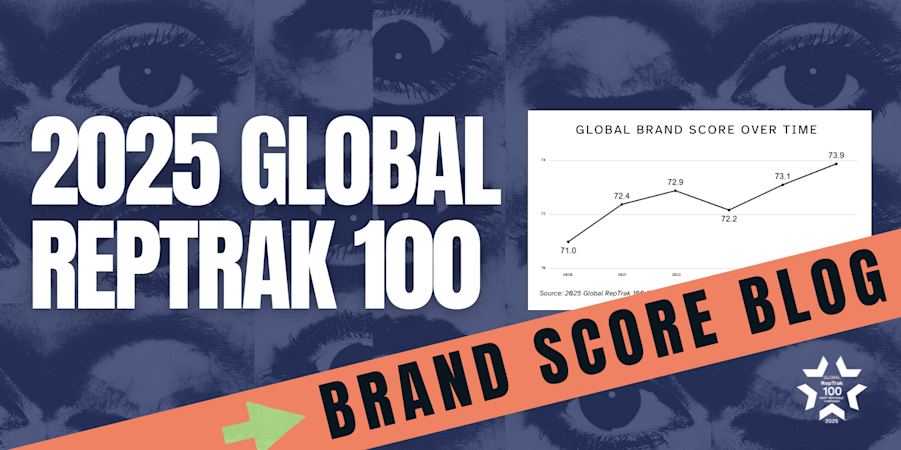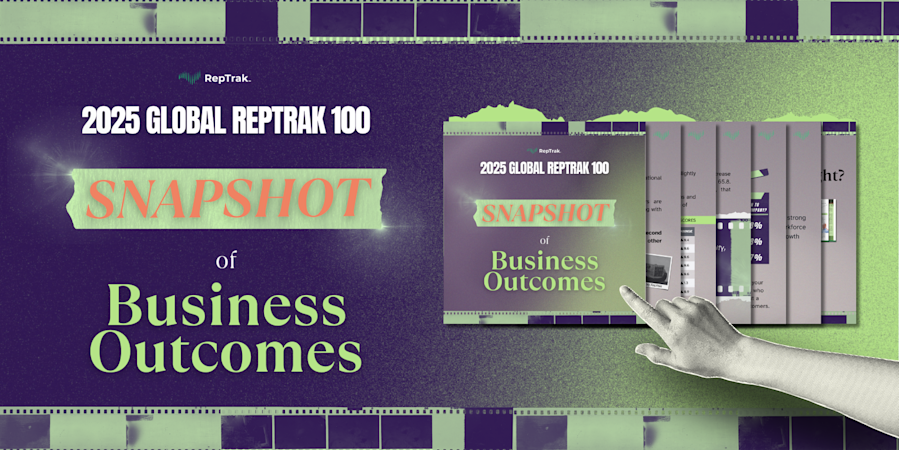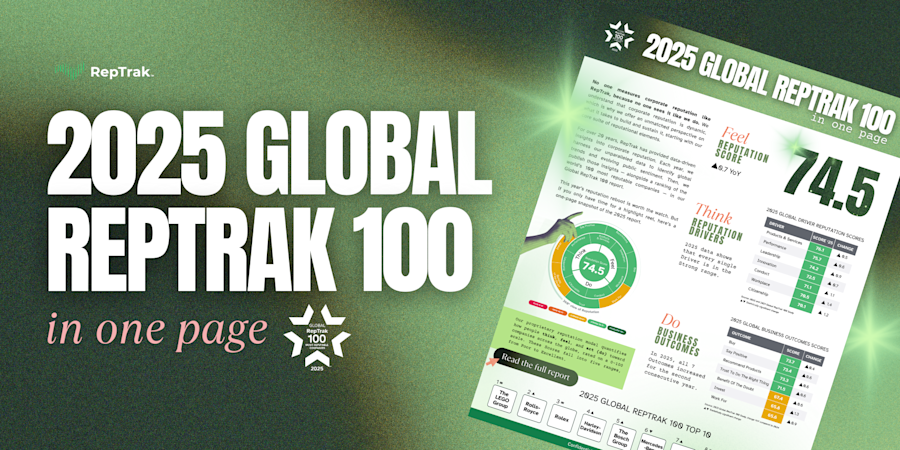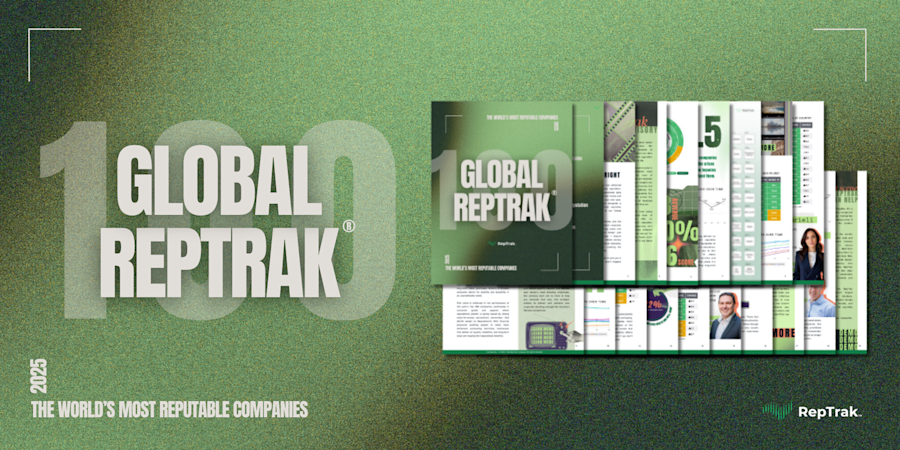US Q3 Data Dose
Corporate Reputation19 Dec, 2022
You don’t create the world’s largest corporate reputation data base on accident. Our reputation monitoring software is always-on, generating and informing RepTrak customers on the depths of their corporate reputation across a collection of constant, distinct factors. But we’re nosy. So we dig even deeper, using our same survey, AI, media, and third-party source tools to understand the distinct impact of current events as they arise.
These Data Doses give us a unique inside scoop, and we can’t wait to share what we found. After all, you can be both nosy and generous.
You may have already seen our Global Q3 Data Dose – now we’re breaking it down even further, narrowing in on our US-specific data.
Like the rest of the world, the US grappled with inflation, mass layoffs, and increasing employer expectations. But the US also faced unique challenges like the overturn reproductive rights and the ongoing conversation surrounding gun control.
We’re ready to dig in.
Americans are experiencing a heightened anxiety surrounding inflation and employee well-being
Which of the following global issues do you believe are important for companies to act on?

US respondents prioritize in correlation with our global data. Inflation, climate change, and employee well-being are top of mind for all. But the US appears to be experiencing a heightened anxiety regarding inflation and employee well-being. Our global results prioritized inflation (27.6%), climate change (24.6%), employee well-being (20.7%) respectively. Meanwhile, the US prioritized inflation (29.4%), then employee well-being (25.4%), and climate change (17.6%).

Big American brands are engaging in mass layoffs, and the unique relationships Americans have with their jobs (ie health insurance, fewer public services) demands more support from their private employers. And how far their paychecks will go in the face of inflation can create a notable tension between the public and their favorite brands. We’ve noticed (and measured) a distinct increase in “employee empathy,” where not just employees want better conditions, but the public wants to support good employers.
With the recent downturn in economic activity, many economists anticipate that a recession is unavoidable. What actions do you want companies to prioritize during a recession?

With further economic uncertainty, inflation and fair treatment of employees still remains at top of mind. Top priorities include maintaining prices, avoiding staff layoffs, new lower cost products, and supporting employee well-being – all at higher rates of importance than their global counterparts.
As Americans look at their job prospects and into their wallets, they have taken note of your organization’s approach. Remember, 66% are willing to work for a company with an excellent Reputation Score, and 63% prefer to buy from companies that reflect their values and will avoid those that don't. They are keeping a close eye on your price fluctuations, your quarterly earnings reports, and employee quality of life.
US consumers want employers to support better rewards, more job security, more flexibility, and more diversity
Which of the following do you believe are the best ways for companies to demonstrate care for employees?

The Great Resignation inspired a massive shift in the employment economy, impacting what jobseekers are looking for in an employer and what consumers want from their brands as employers.
We measure a variety of reputation-influencing elements, encompassing what the public typically considers when formulating and interpreting corporate reputation. Amongst these elements are Workplace and Willingness to Work For Scores. Like the rest of the world, both Scores are down in the US.

These stats are a handy guide to demonstrate how consumers measure care for employees, and what brands can do next to maintain their favor. Their top priorities include total rewards (28.8%), job security (23.4%), flexibility (14.6%), and diversity, equity, and inclusion policies (11.3%) more so than the global audience.
When employer-related stats are dipping, a diligent approach to meeting employee needs resonates with employees and consumers.
Gen Z and younger millennials expect their brands to weigh in on issues like gun control and reproductive rights
How important do you believe it is for businesses to weigh in on Reproductive rights (e.g.,abortion)?

The overturn of Roe v. Wade in June 2022 rattled some and soothed others. The US Supreme Court ruling originally guaranteed a constitutional right to abortion, but the overturn eliminated federal protection, leaving abortion legislation up to the states. This prompted a collection of companies to respond (like Chobani, Nike, Patagonia, and more) many offering to cover expenses for out-of-state travel to procure abortion services.
And this gesture can be particularly valuable in the eyes of younger generations. More than half of 18-24 year olds (53.7%) and nearly half of 25-34 year olds (49.6%), believe it’s “Very Important” for businesses to weigh in on reproductive rights and gun control. But they’re not alone: 69.1% of US respondents believe it is “Very Important” or “Somewhat Important” for businesses to weigh in on reproductive rights – these audiences may not be explicitly considering abortion, but could include other reproductive right factors like access to birth control for both men and women, vasectomy coverage, and more.
How important do you believe it is for businesses to weigh in on Gun Control Legislation?

Gun control legislation has its own passionate US responders. In the wake of the Uvalde tragedy, nearly half of 18-24 year olds (47.9%) and 25-34 year olds (47.2%) believe it is “Very Important” for businesses to weigh in on gun control legislation. This could be more difficult for organizations to directly provide to the public or its employees, beyond explicitly donating and supporting legislation as it arises. Mass shootings are uncomfortably common in the US, so this gives organizations somewhat frequent prompts to respond. When 72.5% of US respondents believe it’s “Very Important” or “Somewhat Important” for business to weigh in on gun control legislation, you could be alienating a large portion of your audience.
____
As world happenings occur, an organization’s actions and inactions shape public perception. That gives organizations a million opportunities to improve or damage their reputation. Knowing how stakeholder needs and expectations fluctuate can help develop informed, strategic responses – it’s one of the many reasons why we recommend a reputation monitoring tool like RepTrak.
Meaningful, relevant, consistent action and communication builds and supports a healthy corporate reputation.
